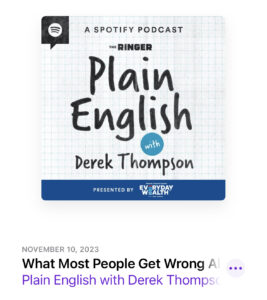
Note: This post is by Dennis Shiao, Founder of Attention Retention.
On the “Plain English” podcast, host Derek Thompson spoke to Morgan Housel, author of “The Psychology of Money” and a partner at Collab Fund. Housel has a new book out titled “Same as Ever.”
The title of the episode was “What Most People Get Wrong About Wealth, Fame, and Happiness.”

I don’t often listen to the end of podcast episodes, but I did for this one – it was an hour well spent.
A brief exchange at the very end was fascinating and has implications to marketing.
Written vs. Audio Content
Here it is:
Thompson: “When I write an idea down and I publish it in an article or a book, the half-life of that written idea feels longer in its specificity. People remember books and articles in a way that they don’t remember the substance of podcasts, I think.
There’s something about writing where print preserves. Books live on shelves and [with] podcasts, a lot of them don’t really live at all. They’re actually designed to die. They’re a stick of bubble gum. They’re something you chew while you’re doing something else.
And then “boop,” the words evaporate and the relationship with the podcaster, the host or the guest, that is retained in some kind of way, but the idea itself somewhat evaporates. And I guess I’m starting to wonder whether ideas are more lost in audio than they are preserved by print.”
(End of Thompson statement)
Housel: “Maybe this is too simplistic, but I think it’s because … myself as a reader, if I came across a profound idea in a book, I stop and I think and I ponder and I highlight. And sometimes I close a chapter and go for a walk to think about it.
But in a podcast it’s much harder to pause and ponder. The host is going to keep talking. When you’re reading you can go at your own pace and that allows you to stop and reflect. Whereas in a podcast I have to go at your pace more or less. I think that’s at least part of it.”
(End of Housel statement)
So yes, ideas can get lost in audio. That’s why I transcribed them and put them in this blog post 😎
The Power of the Written Word
I’m a believer in the power of the written word. While Thompson and Housel’s comments focused on books, there’s also tremendous power in written content that’s published online.
Benefits of online content:
- It’s accessible to anyone with an Internet connection
- It’s easy and convenient to consume
- It lives on forever
- It gets indexed by search engines and made available to searchers
- It can be easily translated into other languages, which expands its reach and potential impact
- It (might) be incorporated into Large Language Models (LLM) and served up” by generative AI tools
Lessons for Content Marketers
Related lessons for your content marketing:
- Provide your content in multiple formats
- If you host a podcast, provide a summary, transcript or “show notes” online. The Ringer published an article page that’s based on this Plain English episode
Also!
Consider the challenges a particular content format might present to your audience. Housel says that podcasts move quickly and the listener has to keep up with the host.
If your podcast provides insights that lead to takeaways, summarize them in a longform article that you link to from the Episode Notes. Mention the existence of this link to your listeners. That gives them the option of closing their phone, visiting your article and pondering about it.
Now your stick of bubble gum gains the power of everlasting flavor.
